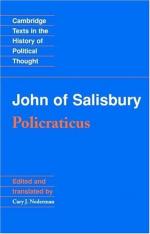|
This section contains 7,613 words (approx. 26 pages at 300 words per page) |

|
SOURCE: Nederman, Cary J. “Aristotelian Ethics and John of Salisbury's Letters.” Viator: Medieval and Renaissance Studies 18 (1987): 161-73.
In the following essay, Nederman traces the influence of Aristotle's ideas in John's letters and suggests that their presence indicates a consistency in principle, in both practical and philosophical application.
To philosophers and political theorists, John of Salisbury represents the pinnacle of twelfth-century learning, his Policraticus and Metalogicon reflecting the breadth and depth of medieval intellectual accomplishment.1 To political and ecclesiastical historians, John is primarily valuable for the observations about great events and important men reported in his extant correspondence and chronicles.2 Of course, this somewhat schizophrenic image of John's work is overshadowed by his more general reputation as the Latin humanist and man of letters preeminent in his age—equally comfortable as administrator, secretary, legal advisor, politician, and schoolman.3 But it is nevertheless the case that little effort has been...
|
This section contains 7,613 words (approx. 26 pages at 300 words per page) |

|


